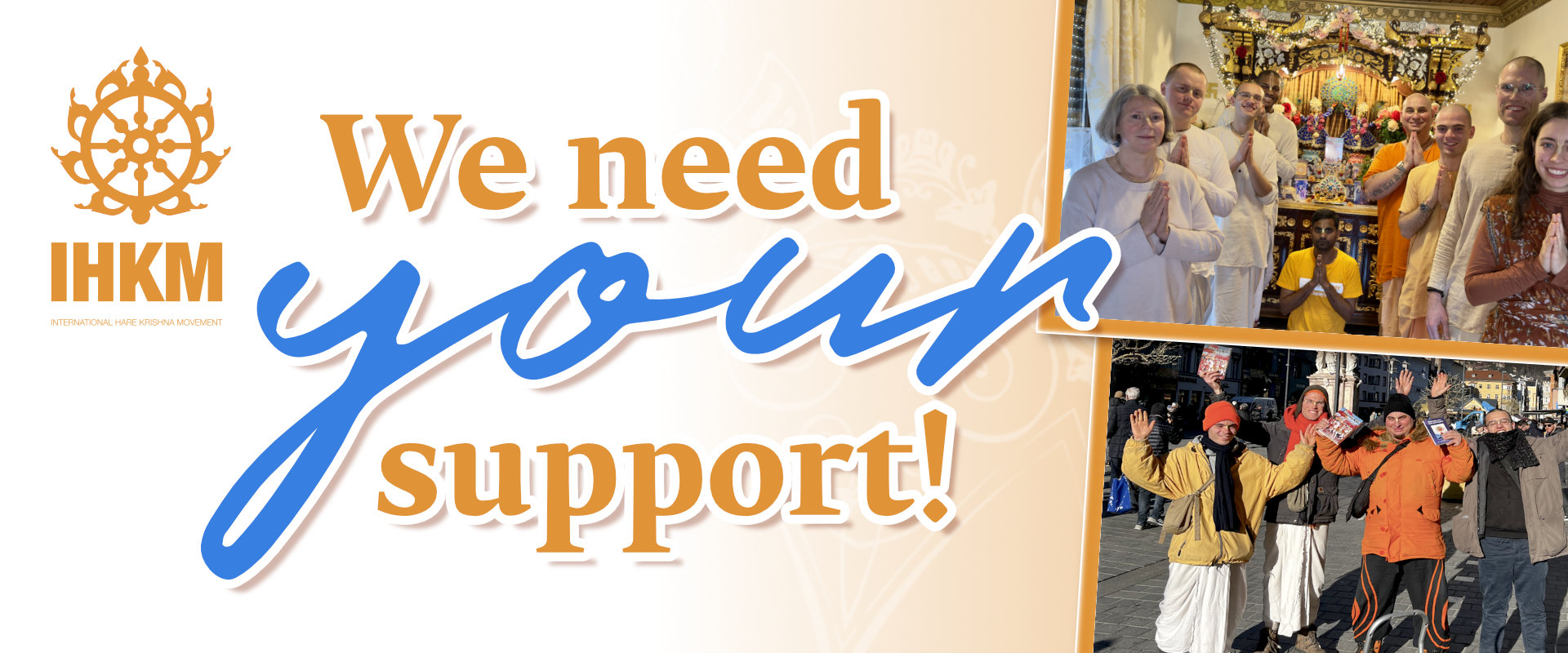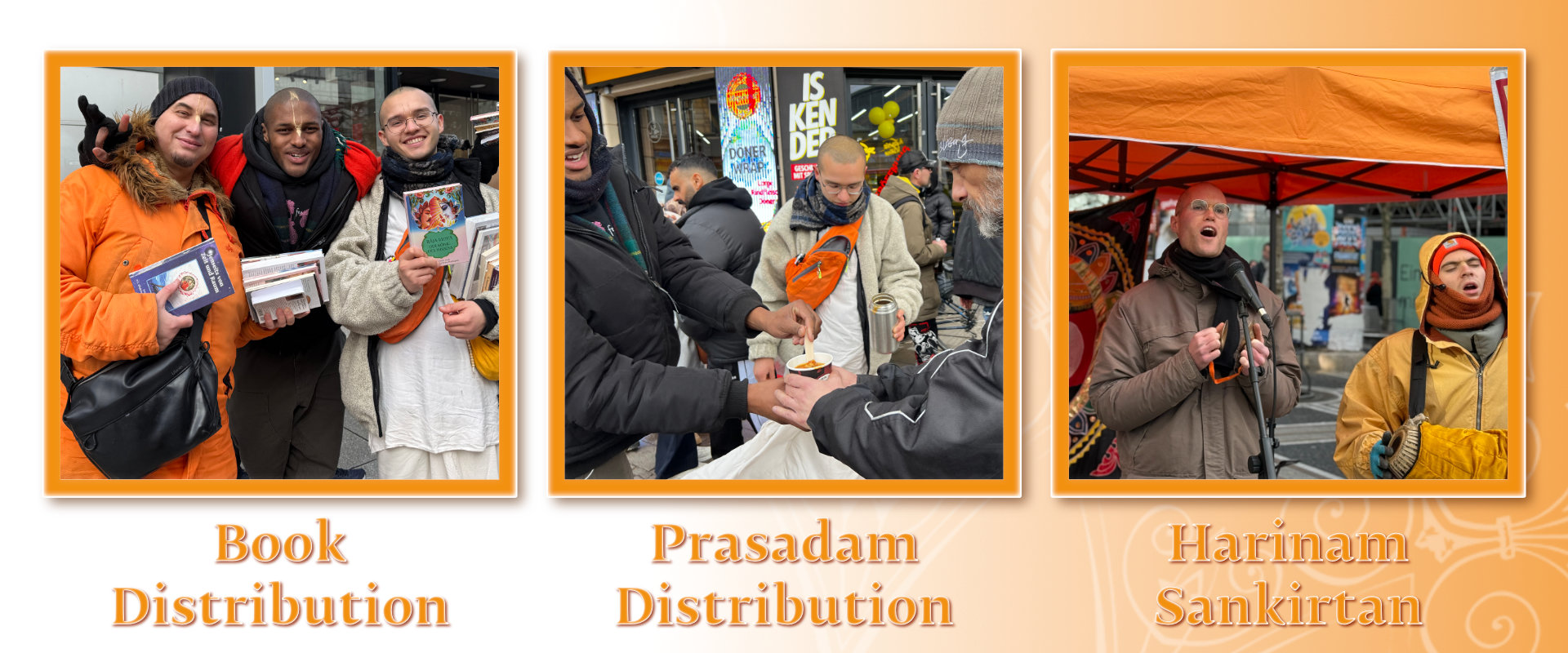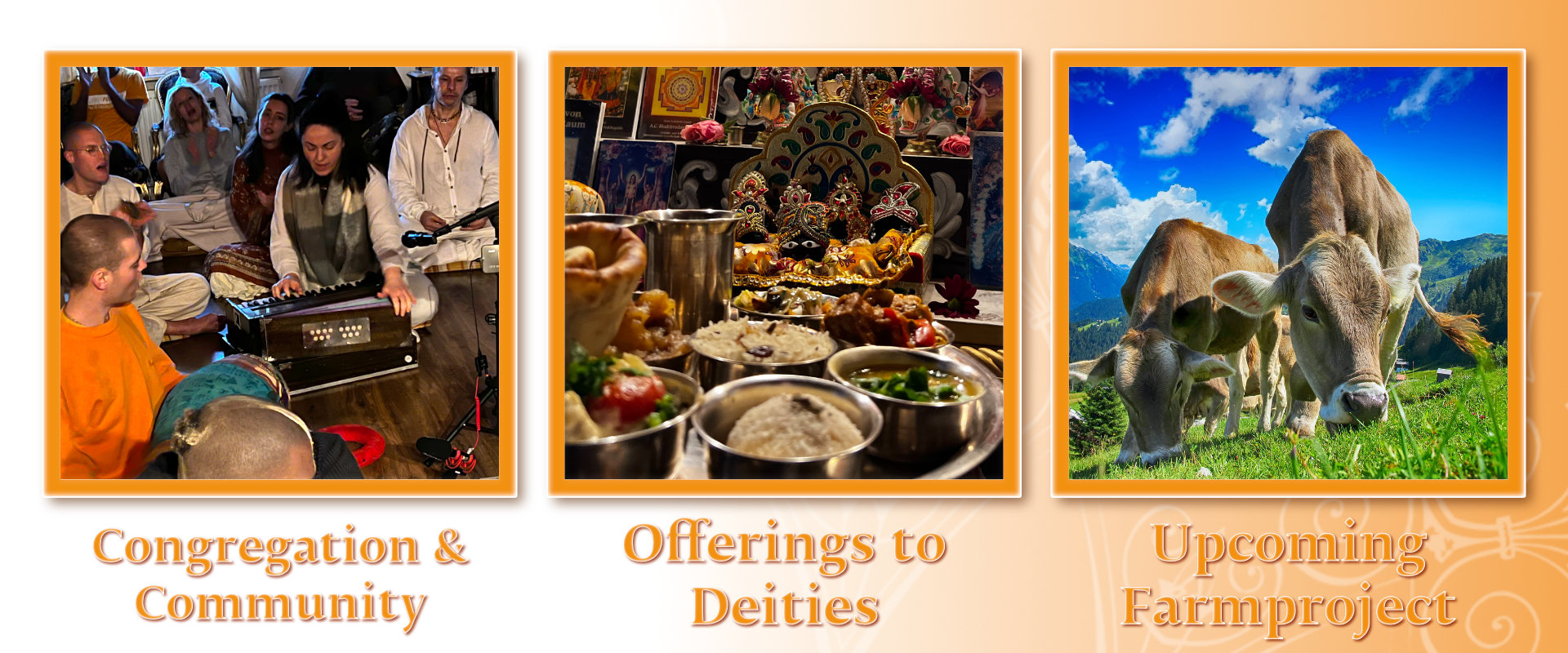PLEASE DONATE AND HELP US
Appeal for donations for the establishment of a farm community in Germany, for the purchase, acquisition and distribution of original Prabhupāda books, and for Prasādam food distribution.

Screenshot
Śrīla Prabhupada’s International Hare-Kṛṣṇa-Movement
Śrīla Prabhupāda: “So develop these farm communities as far as possible. They should be developed as an ideal society depending on natural products not industry. This farm project you should consider very important. The idea is that people can be self sufficient and raise their own foodstuffs and have sufficient milk to save time and chant Hare Krishna. Why should they work so hard in the hellish factories? Let everyone live simply and be Krsna conscious.” (Letter to: Rupanuga and Nityananda)

Bank details below
We need your help, dear Devotees, Friends, Supporters and Sadhus!!
We urgently need donations for the Saṅkīrtan-mission of our beloved spiritual master Śrīla Prabhupāda.
Every Donation, small or big is welcome. The Bank detail you will find below. Please kindly give a donation :-)
People are suffering in this material world due to their lack of vedic transcendental knowledge, precisely because they have forgotten Lord Krishna. By distributing Śrīla Prabhupāda’s original books in German and English language, WE can help people to revive their forgotten relationship with the Supreme Personality of Godhead, Lord Krishna. In this way, we uplift them to Krishna consciousness and thus to love for God. Happiness, peace and prosperity will automatically follow, first individually and then collectively. By sharing the transcendental knowledge of the Vedas, especially the science of devotional service, we become very dear to Lord Śrī Kṛṣṇa and Śrīla Prabhupāda.
In our International Hare Krishna Movement Temple in Germany, in Mainhausen, special focus is given to this Saṅkīrtan/ Harinam service (book distribution of only original Prabhupāda books) and street Harinam (Hare Krishna mantra singing). On 5-6 days a week we go out on the streets to distribute Śrīla Prabhupāda’s original books in the form of transcendental Vedic literature such as Bhagavad Gītā in its present form, Isopanisad, Raja-Vidya, King of Knowledge, Beyond Birth and Death, Beyond Time and Space, etc. Your donations contribute to the cost of travel and printing of Prabhupāda’s original books in German language or the purchase of the original English books from KBI in the UK.
By accepting Krishna Prasādam (spiritualized food), ones Krishna consciousness is awakened. Śrīla Prabhupāda says: “By liberal distribution of prasādam (pure plant-based food offered to Sri Krishna/ God) and saṅkīrtana/ harinama (chanting the holy name together), the whole world can become like Vaikuṇṭha, peaceful and prosperous.”
The amount of prasādam preparations in our temple of the International Hare Krishna Movement in Germany is always calculated to feed not only our temple devotees/ brahmacaries and weekly visitors, but especially the homeless.
The huge amounts of prasādam for our Bhakti Yoga Feast of Love are extra large so that we can take them to Frankfurt Central Station where all the homeless and drug addicts can be found. Krishna prasādam is very popular there and the poor wait every week for us to bring them the delicious prasādam and sometimes they even take a book of ours with them.
Your donation enables us to offer prasādam to the homeless and junkies 1-3 times a week. Without such prasādam, they will surely become animals in their next life. Come and have your own personal experience by accepting the Lord’s mercy by tasting extraordinary and delicious prasādam at our love feast (every Sunday).

Lord Krishna says, “One should worship Me in My deity forms by offering the most excellent paraphernalia” (SB 11.27.15). Such worship brings the greatest benefit possible in human life (SB 11.27.2). The Lord is most pleased when nice presentations of fragrant oil, incense, flowers and palatable foods are offered to Him with love. (SB 11.27.18).
In our temple, Mangal Arati and Gaura Arati are performed every morning and evening. We are bathing and dressing the dieties each and every day and cooking freshly for them each day too. By your donations it will be possible to offer the Gaura-Nitai deities elegant clothing, jewelry, fresh flower garlands, special bhoga offerings, worship paraphernalia, and maintenance.
Our temple provides a spiritual environment for the education of both men and women living a celibate life and engaged in performing devotional service in Krishna consciousness. A grihastha (householder) makes spiritual progress by giving in charity to the other three ashram (brahmacharya, vanaprastha and sannyasa), which are meant solely for spiritual progress. They are not supposed to be burdened with the problems of earning a livelihood for rent, food, clothing and shelter.
In this temple, we are currently 7 full-time devotees, practicing brahmacharya and devoting our entire lives and souls for the cultivation and dissemination of Krishna consciousness and spiritual knowledge. Your donations make it possible to cover the meager expenses of the brahmachari(nis).
Farm-Project
“I have come to your country on a mission & all of you are good souls sent to me by Krishna. So let us cooperatively work together to vigorously spread Krishna Consciousness, to the suffering humanity at large!”
We, the International Hare Krishna Movement, want to live up to our name and are now laying our biggest milestone by creating a place that gives a home to the mission of our spiritual master Śrīla Prabhupāda to carry the holy name of Lord Krishna into the world.
Jiva Jago! For every awakening soul, whether monk or householder, woman or man, devotees of advanced age or the adolescent and next generation, we will create a place of communal living and spiritual refuge, that functions according to Prabhupāda’s motto: “simple living, hig thinking”.
“In a farm community, people can work together, support each other, and create a strong bond based on spiritual values. This is essential for spiritual advancement.”

• approx. 3 hectares of land
• large temple building with Brahmachari ashram
• possibilities for Grihasta accommodation next to the temple
• sustainable & ecological agriculture
• Restaurant and catering service
• Gurukula (school for the children)
• Cows/ cow protection
This project is a special opportunity for everyone to invest some of their accumulated monetary energy (Laksmi) in the devotional service of Lord Krishna and Śrīla Prabhupāda and to actively participate in the Saṅkīrtan mission of Lord Caitanya and Śrīla Prabhupāda. Every donation spiritualizes the work associated with it, which was done to generate the amount, and thus culminates in spiritual progress, i.e. in Krishna-Consciousness.
“I think that for Krishna’s sake we should try to work together, even at the risk of minor personal inconvenience. Our main concern is Krishna. When Krishna’s service is being done well, we should try to forget our personal inconvenience. I know that you are already advanced in this kind of Krishna consciousness, and Krishna will give you more and more intelligence.”
Our full-time temple-members devote their whole lives to realizing this dream, and we would be delighted to have you all by our side, to take such a big step together in the lotus footsteps of our beloved spiritual master A.C. Bhaktivedanta Swami Śrīla Prabhupāda.
“A farm community is a place where people can live in harmony with nature, grow their own food and practice spiritual life. This is the way to achieve real happiness.”
Thank you very much for your support!
We have recently been registered as a non-profit and charitable organization! Here in Germany, as in many other countries, donations to non-profit organizations are tax deductible up to 20% of the adjusted gross income. Calculate for yourself how much tax you can save with your donation:
Krishna Book, Chapter 81: “What the devotee actually offers to the Lord is not required by the Lord, for He is self-sufficient. When the devotee offers something to the Lord, he is acting in his own interest, because whatever a devotee offers to the Lord comes back in an amount that is millions of times greater than what was offered. One does not become a loser by giving to the Lord; one becomes a million-fold winner.”
Bhagavad-Gītā, (18.5) “Acts of sacrifice, charity and penance are not to be given up; they must be performed. Indeed, sacrifice, charity and penance purify even the great souls.”
=============
Donation via Paypal: info@ihkm.org or
Donations to our German Bank Account:
Name: International Hare Krishna Movement
IBAN: DE53 5065 2124 0018 1226 48
BIC: HELADEF1SLS
• A one-time donation. Any amount, however small, is very welcome.
• A permanent donation, with which you become a supporting member. This helps us to keep our projects running.
Thank you for your donation. Your contribution will help provide food, shelter, and a living place for cultivating spiritual life.
Any questions? – info@ihkm.org – Mobile/Whatsapp. +49 176 2811 2250
We issue DONATION CERTIFICATES on request.
We need your exact address to send donation receipts by mail and e-mail address for questions, if any. With the transaction data, you help us to confirm the transaction and thus process your request more quickly.
For donations of up to 300 Euros to non-profit organizations, the cash payment receipt or the booking confirmation from the bank (account statement, direct debit receipt or PC printout for online banking) is sufficient proof of donation for the tax office if it shows the name and account number of the donor and recipient as well as the amount and booking date.
“To teach and promote the Saṅkīrtana movement, i.e. the common chanting of the Holy Names of God as revealed by Śrī Caitanya Mahāprabhu in His teachings” (from Śrīla Prabhupāda’s founding document).